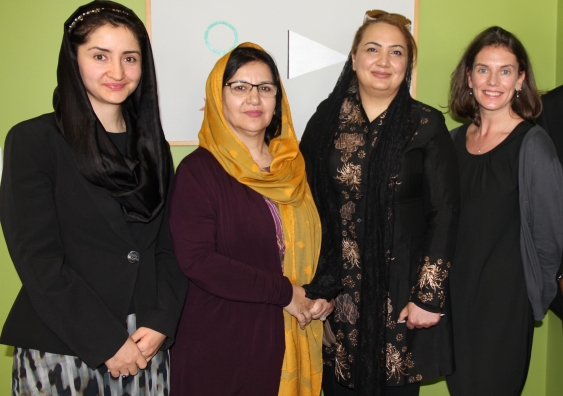Female Afghan politicians visit UNSW
Three Afghan politicians have called for more women in their country to be included in discussions about peace and security, and more international help to end the Taliban insurgency.
Three Afghan politicians have called for more women in their country to be included in discussions about peace and security, and more international help to end the Taliban insurgency.

Susi Hamilton
UNSW Media Office
0422 934 024
susi.hamilton@unsw.edu.au
Three Afghan politicians have called for more women in their country to be included in discussions about peace and security, as their country continues to be plagued by insecurity and increasing fighting after the international combating mission withdrew at the end of last year.
Shukria Barakzai, Farkhunda Zahra Naderi and Dr Gulalai Noor Safai, who are all members of the Afghan Parliament (Wolesi Jirga), visited UNSW’s School of Social Sciences, as part of a larger trip organised by the Department of Foreign Affairs and Trade.
They remain concerned about the Taliban insurgency, an Islamic fundamentalist group, known for the brutal treatment of women, but are also concerned about other conservative influences growing stronger in their country. The US-led invasion against the Taliban began in October 2001, after the September 11 attacks on the US.
“We need support from the international community to finish the war,” said Dr Gulalai Noor Safai, a parliamentarian and ophthalmologist, who worked with victims of trauma in her country. “It was easy for me to get to university, but fear causes families to not allow their girls to go to school.”
“We are fed up with tribes and elders making decisions,” said Sukria Barakzai, who has been in government since 2005 and survived a Taliban suicide attempt on her life with minor injuries in November last year. “We want to make decisions for ourselves.”
While women occupy 28% of the seats in the Parliament after the 2015 elections, there is a long way to go, they told a group of researchers, students and development workers.
“My mother was more lucky than me. She grew up in a more developed, prosperous country,” said Sukria Barakzai, who is an entrepreneur and used to be a journalist. “We are rich enough [in natural resources], but we lack national leadership,” she said. “Extremism is taking our country back.”
Farkhunda Zahra Naderi, who has been in parliament since 2010, called for more women in Afghanistan to be made Supreme Court judges, saying they – not politicians – wield the greatest power when it comes to advancing women’s rights.
“There is less trust amongst women that they can seek justice,” she said. Corruption, lack of access to justice, gender discrimination and a lack of awareness were cited as amongst the issues plaguing the democratic system.
The women’s rights and youth activist also gave the example of a 27-year-old woman who was tortured and killed in front of a crowd, yet no-one, including police officers, risked their lives to defend her, to illustrate the problems with law enforcement protecting women.
The Department of Foreign Affairs and Trade says the Australian Government is committed to the empowerment of women and girls in Afghanistan, providing over $1 billion in official development assistance to Afghanistan since 2001, which includes funding to promote social, political and economic participation by women and girls.
A spokesperson for the Department says Afghan women have come a long way since the fall of the Taliban and it is pleased to support the visit of these three influential women MPs to share lessons and challenges on women’s leadership.